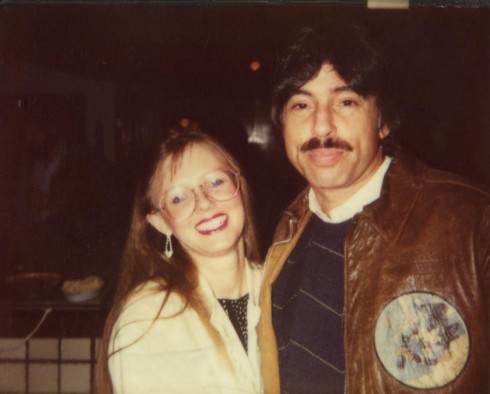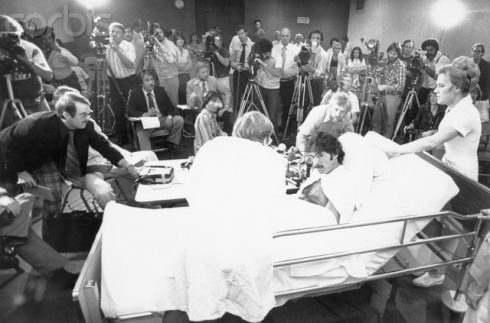CHASING ANNIE HALL
Paul Morantz and his Annie Hall (Nikki Schevers) in the late 1970’s
BY PAUL MORANTZ
Two of my life’s best friends—Nicky and Nikki—met for the first time on July 4th, seven years ago, on an unseasonably cool summer day. Sharing the same names phonetically was not a coincidence.
While driving my ‘Nicky’ in my l957 Porsche Speedster in the annual Pacific Palisades Fourth of July Parade, I spotted the other ‘Nikki’ at the very curb she and her family had occupied during each parade for many years—directly in front of what once was the First National Food Company, the restaurant in which she had formerly worked. It had been 17 years since we had seen one another. She sat in a wheel chair with a blanket covering her knees.
Quickly maneuvering my car out of the parade, I hurried back to her location. She had waited with her sister Terry, and her friend Carole, as I knew she would. She immediately understood the origin of my Nicky’s name. But he, a 12 year-old border collie, had no idea the soft hand stroking his head, belonged to his namesake.
I knew she had been battling breast cancer for a long time. And just months earlier, I had endured more than a two-year stint of my own, while lying anemic on a couch with similar problems. When we hugged, neither of us seemed to want to let go.
Back in the late 70’s, I was a young lawyer coming off my biggest case thus far in my early career —uncovering the kidnapping and selling of skid row alcoholics to a chain of nursing homes that kept them on Thorazine, while billing MediCal for their maintenance. With my fee banked from that case, I was searching all areas of Los Angeles for a home, when a Palisades realtor suggested I have lunch at First National Food Company. It impressed: Brick floors, antique oak tables, hanging plants, and featured a diverse, healthy menu with an accent on Mexican cuisine.
Daisy, the cook, had a laugh that could flip a hamburger. The waitresses were young, cute and wore cut-offs. On Sunday, if it was crowded, you could share a community table with other diners. The town was just that friendly. The local swimmers met there for breakfast on weekdays after morning workouts. (The successful television series “Baywatch” actually originated from that very table.)
She came to take my order. A pretty blonde twentyish-girl named Nikki Schevers. She wore lace, an antique-like dress, and a garden hat. She seemed a character from Scarborough Fair. Her voice reflected her four years in Ann Arbor while attending the University of Michigan. Everyone, it seemed, knew her.
She saw me looking at ads and asked, “Are you buying a house in the Palisades?” I told her that I was looking everywhere. Her response was: “Well, Lah-de-dah.” Nikki then gave me her Palisades “Shangri-La” speech. The town was heaven on earth; quiet, uncrowded, and everyone was so nice. No one grows old. She insisted I must move here. By meal’s end, she promised to find my house. While I represented nothing more to her than a passing stranger, she called shortly after we had met and said she had found my house. It was located on Bollinger Drive.
The house was only about 1,100 sq. feet, but the floors were hardwood; the fireplace was brick, and red bougainvillea hung across bay windows. Outside on the patio was a tall red-brick barbecue grill. I paid the whopping $100,000 price and told Nikki she was part of the deal. Anyone who had found a stranger a home, I explained, must remain friends for life.
Soon, I was adopted by the whole Michigan clan. Sisters Leslie, Terry, Wendy and Martha, also turned out to be part of the arrangement. So did brothers Jamie and Mark. I rubbed it in each year when USC beat the Wolverines in the Rose Bowl, which was rather often back then.
No one would have ever picked us as best friends. I was suspicious by nature and my work summoned up that same distrust, as I pursued psychopaths on a regular basis. After the nursing home saga, my specialty became investigating cults, self-help groups, non-licensed health care providers, and psychotherapists who abused their patients. Nikki was all about Tarot cards, the stars, reincarnation, and Eastern healing. If there was a thunderstorm outside, she would allow the devil to warm by the fire and drink hot chocolate, while listening and sympathizing with his problems.
While I hoped that I didn’t approach Satan’s complexity, Nikki was always there for me, no matter how deep the problem. She advised on how to win a girl and how to recover when losing her. She even shared the pain of my ongoing legal injustices. I never felt alone. All who knew her could similarly count on her.
During that same period, while watching Woody Allen’s latest film, “Annie Hall,” something had caught my attention about Diane Keaton’s performance as Annie. Her clothes, style, demeanor, accent, and mannerisms were all just too familiar. Then Ms. Keaton uttered her now-famous line, “Oh well, Lah-de-dah.” Oh-My-God! There it was—the unforgettable phrase I had come to know so well. And from that day forward, Nikki became my own private ‘Annie Hall.’
By the following summer, those close to me had known that my life was in danger for having sued and exposed Santa Monica’s Synanon, the first-ever self-help drug rehab that was now a known religious cult that engaged a secretly trained hit-force to attack its enemies. When I was bitten later that same year by a rattlesnake placed in my mail box by Synanon’s ‘Imperial Marines,’ Nikki and Leslie were the first arrivals at the hospital that evening. Nikki had nurses place a magnet on my hand and turquoise charms on my arm. To this day, the Schevers’ clan believes it saved my life by forming a circle, clasping hands and “fixing my aura.”
October 13, 1978: Paul Morantz surrounded by news media after the Synanon rattlesnake attack
When I returned from the hospital, and before members of the Sheriff’s Department moved into my home, it was Nikki who stayed and slept by my side while I was in pain, with body parts still swollen. She occasionally rose to inspect the door locks and windows. During the five years of court proceedings, she stayed at my side.
On a winter day in l982, Nikki was married in a far-off Yosemite wedding. It seemed all of Pacific Palisades was there that day.
I also married and had a son several years later, and by then, Nikki had a boy and a girl. The children seemed to be the focus of most of our conversations during those years. When I divorced, Nikki was once again there by my side, lending her support.
And then two years later, she was suddenly gone– no more dinners, no more talks—and no more ‘lah-de-dah’s’. For me, it came without warning, and I felt as if a piece of me had broken off and flown away.
Her Tarot cards had foretold the future; the Palisades was going to become less a ‘Shangri-La’– with too many new homes being built, and the town’s tranquility interrupted by arguments over parking spaces. The trend of Los Angeles residents escaping to the Northwest was in full throttle, so Nikki hopped an outbound Seattle flight late that year, after deciding that it offered a better atmosphere in which to raise her kids. Then, like a distant train whistle, the rest of my clan was gone as well.
In l995, my son picked out the next ‘Nicky’ from a litter of border collie puppies. The new Nicky became my best friend, like the Nicky before him—the smartest border collie I had ever seen. Most of the Palisades had known him. The local paper had done a full-page story on his familiarity with the townspeople.
A few years into this century, I became sick. I learned what it was like to be poked by needles daily, while enduring X-rays and MRI’s, and lying helplessly, but always with the constant support of good friends. And then early that year without much fanfare, I somehow suddenly awoke from my long ordeal. It had been many years since I had driven my Porsche in the annual parade, so driving behind Gerry Blanck’s karate school crew, which I had once belonged, seemed just like old times.
The following day after reuniting with Nikki, she slipped in the shower and broke her hip. I spent several days at the hospital holding her hand in mine. She asked if we had perhaps been married in another life. “No doubt,” I said through my tears. “But we wedded in our own way in this lifetime.”
Today, the First National Food Company is gone. It was replaced by Kay & Dave’s Mexican Restaurant. Gone are the brick, the oak, and the breakfast gang. My first house on Bollinger Drive has been replaced by a two-story remodel. The owner who handled the construction had promised to send me the infamous mailbox, but it never arrived. Mort’s Deli, the town ‘community center,’ closed, and the Hot Dog Show is long gone. Stores that were once nothing more than hobbies for bored housewives are now real businesses. What was once Synanon in Santa Monica is now the Hotel Casa Del Mar.
This city has become too crowded for me. The old analogy of the Palisades as a mid-western town dumped alongside a beach between Santa Monica and Malibu is no longer applicable. A few friends from the past are still there, and when we meet, we talk of the golden years. Still, you probably can’t do much better in Los Angeles than the Palisades. After all, the town still has Arnie Wishnick at the Chamber of Commerce office, and the Fourth of July parade has no plans for any changes.
I visited Nikki several times in Seattle. The last time was in 2008, and it was snowing as we gathered for her funeral.
Eight months later, my Nicky died.
I am uncertain of my own prognosis. In many ways, I am probably living on borrowed time. But what I do know is that I am counting on a long-awaited reunion with my dear Annie Hall. I believe it is all there in the Tarot cards.
Oh well, Lah-de-dah.
Paul Morantz is an attorney and investigative journalist who has specialized in cult and brainwashing cases for more than 30 years. His latest book is, “Escape: My Life Long War Against Cults.” He lives in Los Angeles, California.
Comments
Leave a Reply
You must be logged in to post a comment.





